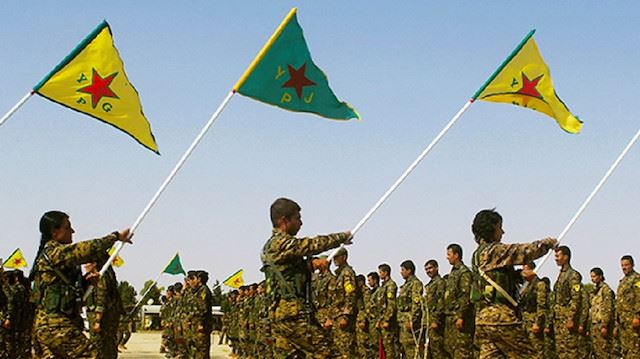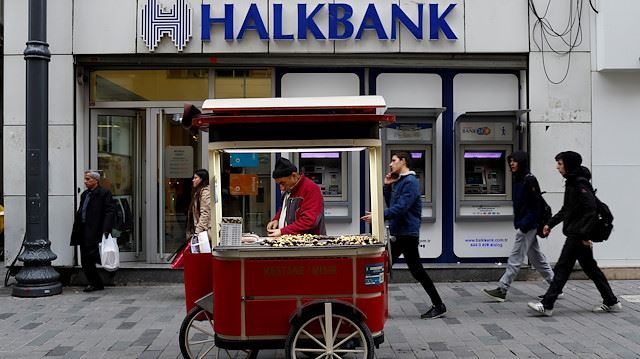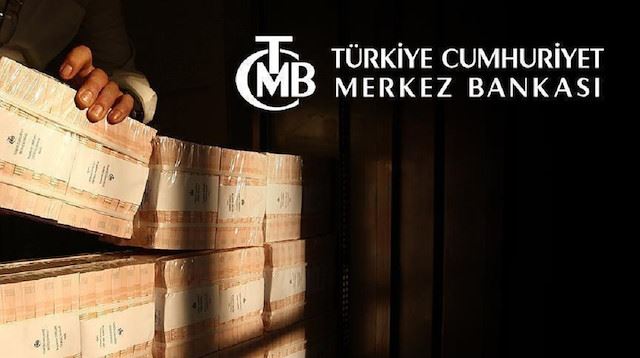Israeli settlers on Wednesday attacked Palestinian villagers harvesting olives in the northern occupied West Bank. The attack took place in Burin vill
Israeli settlers on Wednesday attacked Palestinian villagers harvesting olives in the northern occupied West Bank.
The attack took place in Burin village, near Nablus city, where settlers beat Palestinian villagers, according to Ghasan Daghlas, a Palestinian Authority official who monitors settlement activities in the northern West Bank.
Daghlas said four foreign activists were among the injured villagers, who came to support Palestinian villagers in harvesting their crops and to protect them from settlers’ attacks.
Turkey’s private sector external debt down in August
Turkey’s outstanding short-term foreign private sector debts fell in August, the country’s Central Bank (CBRT) said on Wednesday.Excluding trade credits, the private sector’s short-term external loans amounted to $11.8 billion, down $3.6 billion over the end of 2018.According to the bank, 72.5% of all short-term loans consisted of liabilities of financial institutions.Some 51% of short-term credits were in the U.S. dollar currency, while the rest of them were in euro (29.1%), Turkish lira (19.5%), and other currencies (0.4%).On the long-term side, the private sector’s overseas loans totaled $196.6 billion as of August, dropping $12.8 billion compared to the end of last year.Non-financial institution liabilities constituted 53.2% of long-term external loans, the bank said.The U.S. dollar dominated long-term loans by constituting 60.7% of them, while euro and Turkish followed it with 33.8% and 3.9% respectively.”Private sector’s total outstanding loans received from abroad based on a remaining maturity basis point out to principal repayments in the amount of $54.3 billion for the next 12 months by the end of August,” it added.
He added that settlers set fire to some of villagers’ farms.
In another incident, local media reported that Jewish settlers attacked farmers in Jabaa town in the Beit-Lahim governorate in the southern West Bank, where they threw stones at farmers.
Palestinians living in the Israeli-occupied West Bank complain of frequent attacks by Jewish settlers, which often include acts of physical violence, vandalism and the destruction of Palestinian farmlands.
Palestinian government sources say that in West Bank and Gaza Strip, there are nearly 8.5 million olive trees, in which olive production sales constitute 1% of the Palestinian national income.

West holds onto lies it crafted about YPG
The claim that the Kurdish People’s Protection Units (YPG) remains the most effective force in the fight against Daesh and that any intervention to harm this Syrian offshoot of the terrorist PKK would necessarily disrupt the fight against Daesh — a claim perpetually put forward by those who are opposed to Turkey’s Operation Peace Spring — is simply disinformation.The military intervention in the east of the Euphrates, whose preparations had long been underway, finally began last week, after consecutive statements from Turkish officials that an operation was impending. The start of the operation was immediately followed by a chorus of countries headed by the U.S. making statements against Ankara’s move. As we can clearly see, what underlies all these opposing statements are theses propagated in recent years in various influential international platforms in order to praise and highlight the “importance” of the YPG.When we analyze the criticisms leveled at the operation, we find that they are generally based on two particular claims. The first one is that the YPG is the most effective force in the fight against Daesh and that this fight will be hampered inasmuch as the YPG is harmed. In order to legitimize the presence of the YPG in the area, the Western public opinion, especially the U.S. media, have created the kind of narrative about the fight against Daesh that strengthens their own theses about this struggle, whereas the truth of the matter is that there were almost no other actors apart from Turkey that supported the Syrian opposition forces in the bloody battle they fought against Daesh in the last quarter of 2013 and the first half of 2014, although even the Turkish support then was limited. Syrian opposition forces cleared the countryside of Idlib and Latakia of all Daesh elements without air support. In the regions to the east of the Euphrates, however, and especially in Raqqa, Daesh defeated the opposition forces with the support of the Assad regime. Targeting opposition positions and not hitting the Daesh militants dug in nearby was a strategy of the Assad regime that was continuously witnessed for years until the fall of Aleppo. This is to explain that what the Syrian opposition was deprived of was not only air support: thanks to the Assad regime, which continuously targeted them while turning a blind eye to the Daesh militants, the latter were able to roam the land freely as if supported by an air force.The Assad regime’s plot to establish the opposition forces as their archenemy and then crushing them to open up greater swathes of territory for Daesh were vital moves for laying down the foundations of a choice to be forced upon the Western public opinion in the coming years: “me or Daesh”. And when the YPG and its sponsors began to utilize this handy, legitimizing feature of the Daesh presence, the demographic changes already underway in Syria picked up even more speed, because the YPG had a very significant “weapon” that the regime did not: the U.S. Air Force.Video: Orthodox Jews in US support Turkish Peace Spring Operation‘Legitimizing’ function of DaeshThe U.S. provided tremendous support to the YPG in the form of both weaponry and ammunition as well as military training, whereas it had previously not supported the Syrian opposition against Daesh in the Aleppo countryside. A natural outcome of this American behavior was the formation of a PKK corridor as a result of Syrian opposition forces losing territory to Daesh and this very territory ending up in YPG hands thanks to intense U.S. air support. The U.S. nourished and nurtured an organization — the Syrian offshoot of the terrorist PKK — even though this went against the sociological reality on the ground, while also peddling, through its enormous media power, the illusion that this PKK offshoot was the only force that could fight Daesh. But soon after that, Turkey launched Operation Euphrates Shield and Operation Olive Branch, both of which demonstrated the capabilities of the Syrian opposition against Daesh when provided with the necessary support while also revealing how ineffectual the YPG actually was in the absence of U.S. air support.The other thesis comprising the basis of the claims about Turkey’s military intervention is Turkey’s alleged pursuit of “demographic engineering” in the region. The theses aiming to legitimize the YPG universally “market” it as the representative of the Kurds, and in the international media this organization is often referred to as “the Kurds” in a very generalizing way. In addition, it was claimed that a military intervention into the YPG-controlled areas would result in a demographic tragedy. This, however, is contrary to the realities on the ground, too.Manbij, Tel Abyad, Raqqa, Al-Hasaka and Deir ez-Zor, which are currently under YPG control, are predominantly Arab regions. And a number of other major districts with smaller populations such as Rasulayn, Amuda, Qamishli and Ayn al-Arab have predominantly Kurdish populations. However, with the exception of Ayn al-Arab, the other districts have historically given very low levels of political support to the YPG. The YPG has been engaging in demographic engineering through brutal means to become the only force to be reckoned with in this region although it is extremely difficult for the YPG to keep this territory under control for long due to its ethnic composition and ideology. Amnesty International and Human Rights Watch reports have documented the unlawfulness of the YPG actions in the Arab territories that it seized and the demographic changes these actions have led to. Likewise, there are plenty of testimonies and visual materials proving that, in Amuda and Qamishli, two of the first regions in Syria to rise against the regime in 2011, the armed groups that intervened in the anti-regime demonstrations were also affiliated with the YPG. The oppressive policies of the YPG, which does not tolerate a single opposing voice in the Kurdish population, have led so many thousands of Syrian Kurds to leave their hometowns and made it impossible for any alternatives to the YPG to emerge in the region.The process unfolding before us shows that the weeks and months ahead will see many more manipulation attempts and black propaganda campaigns launched by the Western supporters of the YPG as to why they support the YPG and why they should punish Ankara. For this reason, we must keep our focus on the untold aspects of the fictional story that “the YPG is the only option in the fight against Daesh and the only representative of the Kurds” — a story constantly peddled to the international public opinion — and on every detail of this story purposely kept from the public.Turkey remands four trying to recruit children for PKKTurkey’s anti-terror operation rightful: Experts

US prosecutors charge Halkbank over Iran sanctions
U.S. federal prosecutors filed charges Tuesday against Turkish lender Halkbank in Manhattan federal court.The six-count indictment includes conspiracy to defraud the U.S., conspiracy to violate the International Emergency Economic Powers Act, bank fraud, conspiracy to commit bank fraud, money laundering and conspiracy to commit money laundering.In a statement, the Southern District of New York indicted the bank over its alleged participation in a scheme to evade U.S. sanctions on Iran.According to the statement, Halkbank will have to answer for its conduct in a U.S. court.”The charges contained in the indictment are merely accusations, and the defendant is presumed innocent unless and until proven guilty,” said the statement.In July, Hakan Atilla, 48, the former deputy director-general at the Turkish state lender, was released from a federal prison. He was sentenced in May 2018 in New York for violating U.S. sanctions on Iran.
